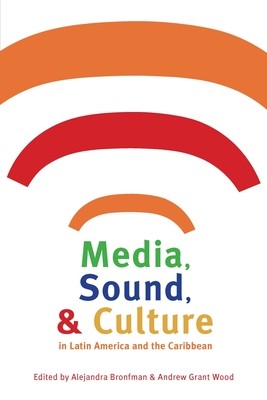
- We will send in 10–14 business days.
- Publisher: University of Pittsburgh Press
- ISBN-10: 0822961873
- ISBN-13: 9780822961871
- Format: 15.2 x 22.6 x 1.5 cm, softcover
- Language: English
- SAVE -10% with code: EXTRA
Media, Sound, & Culture in Latin America and the Caribbean (e-book) (used book) | bookbook.eu
Reviews
Description
Outside of music, the importance of sound and listening have been greatly overlooked in Latin American history. Visual media has dominated cultural studies, affording an incomplete record of the modern era. This edited volume presents an original analysis of the role of sound in Latin American and Caribbean societies, from the late nineteenth century to the present. The contributors examine the importance of sound in the purveyance of power, gender roles, race, community, religion, and populism. They also demonstrate how sound is essential to the formation of citizenship and nationalism.
Sonic media, and radio in particular, have become primary tools for contesting political issues. In that vein, the contributors view the control of radio transmission and those who manipulate its content for political gain. Conversely, they show how, in neoliberal climates, radio programs have exposed corruption and provided a voice for activism. The essays address sonic production in a variety of media: radio; Internet; digital recordings; phonographs; speeches; carnival performances; fireworks festivals, and the reinterpretation of sound in literature. They examine the bodily experience of sound, and its importance to memory coding and identity formation. This volume looks to sonic media as an essential vehicle for transmitting ideologies, imagined communities, and culture. As the contributors discern, modern technology has made sound ubiquitous, and its study is therefore crucial to understanding the flow of information and influence in Latin America and globally.EXTRA 10 % discount with code: EXTRA
The promotion ends in 16d.16:50:20
The discount code is valid when purchasing from 10 €. Discounts do not stack.
- Publisher: University of Pittsburgh Press
- ISBN-10: 0822961873
- ISBN-13: 9780822961871
- Format: 15.2 x 22.6 x 1.5 cm, softcover
- Language: English English
Outside of music, the importance of sound and listening have been greatly overlooked in Latin American history. Visual media has dominated cultural studies, affording an incomplete record of the modern era. This edited volume presents an original analysis of the role of sound in Latin American and Caribbean societies, from the late nineteenth century to the present. The contributors examine the importance of sound in the purveyance of power, gender roles, race, community, religion, and populism. They also demonstrate how sound is essential to the formation of citizenship and nationalism.
Sonic media, and radio in particular, have become primary tools for contesting political issues. In that vein, the contributors view the control of radio transmission and those who manipulate its content for political gain. Conversely, they show how, in neoliberal climates, radio programs have exposed corruption and provided a voice for activism. The essays address sonic production in a variety of media: radio; Internet; digital recordings; phonographs; speeches; carnival performances; fireworks festivals, and the reinterpretation of sound in literature. They examine the bodily experience of sound, and its importance to memory coding and identity formation. This volume looks to sonic media as an essential vehicle for transmitting ideologies, imagined communities, and culture. As the contributors discern, modern technology has made sound ubiquitous, and its study is therefore crucial to understanding the flow of information and influence in Latin America and globally.

Reviews